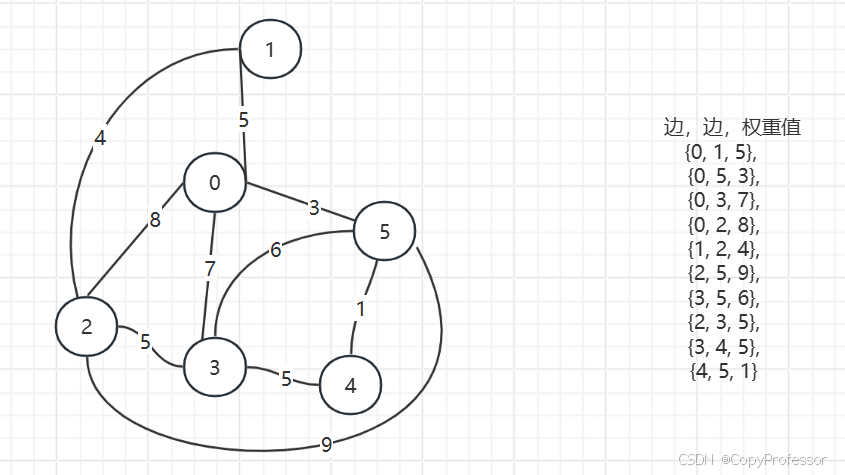实现描述
为了造出一棵最小生成树,我们从最小边权的边开始,按边权从小到大依次加入,如果某次加边产生了环,就扔掉这条边,直到加入了 n-1 条边,即形成了一棵树。
实现代码
- 首选我们对所有的边,按照权重排序;
- 之后,从小到大选择边,如果当前的边已经连通过了,则放弃此边,查看下一条边;若没有连通过,通过并查集进行连通;
- 直至所有点都访问过,此时,完成。

如上图,节点0~5,边关系如上;
先对边权重进行从小到大排序,得到:
java
[{
"u":4,
"v":5,
"weight":1
},{
"u":0,
"v":5,
"weight":3
},{
"u":1,
"v":2,
"weight":4
},{
"u":0,
"v":1,
"weight":5
},{
"u":2,
"v":3,
"weight":5
},{
"u":3,
"v":4,
"weight":5
},{
"u":3,
"v":5,
"weight":6
},{
"u":0,
"v":3,
"weight":7
},{
"u":0,
"v":2,
"weight":8
},{
"u":2,
"v":5,
"weight":9
}]然后依次选择排序后的边:

下面代码对应上图数据及其过程:
java
import com.alibaba.fastjson.JSONObject;
import lombok.AllArgsConstructor;
import lombok.Data;
import lombok.NoArgsConstructor;
import org.jetbrains.annotations.NotNull;
import java.util.*;
public class kruskal {
/**
* 边定义
*/
@Data
@AllArgsConstructor
@NoArgsConstructor
static class Edge implements Comparable<Edge> {
int u, v;
int weight;
@Override
public int compareTo(@NotNull Edge o) {
return weight - o.weight;
}
}
static List<Edge> getKruskalEdges(int nodeNum, int[][] grid) {
List<Edge> result = new LinkedList<>();
List<Edge> edges = new LinkedList<>();
for (int i = 0; i < grid.length; i++) {
int u = grid[i][0];
int v = grid[i][1];
int weight = grid[i][2];
edges.add(new Edge(u, v, weight));
}
Collections.sort(edges);
UnionFindTemplate uf = new UnionFindTemplate(nodeNum);
Set<Integer> visited = new HashSet<>();
for (Edge edge : edges) {
if (uf.connected(edge.u, edge.v)) {
continue;
}
uf.union(edge.u, edge.v);
visited.add(edge.u);
visited.add(edge.v);
result.add(edge);
if (visited.size() == nodeNum) {
break;
}
}
return result;
}
public static void main(String[] args) {
int nodeNum = 6;
int[][] grid = {
{0, 1, 5},
{0, 5, 3},
{0, 3, 7},
{0, 2, 8},
{1, 2, 4},
{2, 5, 9},
{3, 5, 6},
{2, 3, 5},
{3, 4, 5},
{4, 5, 1}
};
System.out.println(JSONObject.toJSONString(getKruskalEdges(nodeNum, grid)));
}
}其中,并查集模版的实现如下:
java
public class UnionFindTemplate {
int[] parent;
int[] size;
int n;
public int setCount;//连通分量个数
public UnionFindTemplate(int n) {
this.n = n;
this.parent = new int[n];
this.size = new int[n];
setCount = n;
Arrays.fill(this.size, 1);
for (int i = 0; i < n; ++i) {
parent[i] = i;
}
}
public int findParent(int x) {
if (parent[x] == x) {
return x;
} else {
parent[x] = findParent(parent[x]);
return parent[x];
}
}
public void union(int x, int y) {
x = findParent(x);
y = findParent(y);
if (x == y) {
return;
}
if (size[x] < size[y]) {
int temp = x;
x = y;
y = temp;
}
//y合并到x
parent[y] = x;
size[x] += size[y];
setCount--;
}
public boolean connected(int x, int y) {
x = findParent(x);
y = findParent(y);
return x == y;
}
}